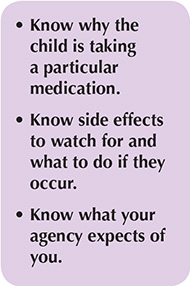Children in foster care—especially those who have experienced trauma—often require mental health treatment. For many, that treatment involves prescriptions for psychotropic medications.
Psychotropic (pronounced “sike-oh-trope-ick”) medications affect a person’s mind, emotions, moods, and behaviors. Examples include psychostimulants such as Adderall® and Ritalin®, antipsychotics such as Seroquel®, and antidepressants such as Paxil® and Zoloft®.
Psychotropic Medications and Children in Child Welfare
Between 13% and 52% of children involved with child welfare use psychotropic meds—rates of use notably higher than children in the general population.As they age, children in foster care are more likely to be prescribed psychotropics. The rate is 3.6% among 2-5 year-olds, 16.4% among 6-11 year olds, and 21.6% among 12-16 year olds. Also, as they age children are more likely to be prescribed multiple psychotropic drugs.
In foster care, males are more likely to receive psychotropics (19.6%) than females (7.7%).
Kids in the most restrictive placement settings are most likely to receive psychotropics. Nearly half of young people in group or residential homes take at least one psychotropic.
Source: USDHHS, 2012
When it comes to managing children’s medications, foster parents and kin caregivers have an important role to play. After all, you’re the one who spends the most time with the child. You know whether that child is taking the medication appropriately and how that medication affects that child’s behavior.
So what can foster parents and caregivers do to make sure children taking psychotropic medications get the care and the oversight they need? Here are some suggestions:
1. See this as a team effort. Managing children’s care is a shared responsibility. Important partners in this task include your supervising agency, the birth family, and the DSS that has custody of the child. When it comes to managing medications, it is very important that the team work with someone with special expertise in this area—usually this will be the child’s mental health clinician or physician.
 It can be intimidating to work with doctors and mental health clinicians, but you bring something essential to the table—information about the child and how they are doing. Without this, it’s hard to make good decisions or recommendations about treatment and medications.
It can be intimidating to work with doctors and mental health clinicians, but you bring something essential to the table—information about the child and how they are doing. Without this, it’s hard to make good decisions or recommendations about treatment and medications.
2. Be sure you have the information you need. Communicate regularly with the child’s social worker, mental health provider, and physician to make sure you have a current list of all children’s prescriptions and dosages.
3. Watch for side effects. The majority of children will not experience any side effects from their medications; however, side effects are possible. Different psychotropic medication can cause different side effects so it’s important that you are familiar with the possible side effects.
If a child in your care is taking medications, be sure to ask the prescriber about possible side effects and what to do if they occur. If you see anything that concerns you, be sure to let the prescriber know.
4. Beware of over-medication or inappropriate medication. The same dose of medication can have different effects in two different people because not all people react to medications the same. Just because a dosage doesn’t cause drowsiness in one child, doesn’t mean it won’t cause another child to be drowsy. This is similar to being aware of side effects. If the medication seems to be having a negative impact on the child for any reason, let the child’s social worker and prescriber know right away.
5. Document and communicate. Track and log any changes you see in your child’s behavior, wellness, or functioning, especially when a medication has just been introduced or an adjustment has been made. Share this information with other members of the team caring for the child.
6. Remember that medication often works best when used in combination with therapy. When it comes to treating anxiety, depression, or other mental health needs, medication alone is sometimes not as effective as medication in combination with therapy. If a child in your care is taking psychotropic medication, but is not receiving therapy, ask the child’s social worker and other members of the child’s team if therapy would be appropriate.
7. Listen to the child. Children and youth are a great source of information about their medications and how well they are working. Older youth can use a journal to note any changes in their experience on a medication, concerns they have, or responses to treatment. Sharing these written notes with physicians and DSS staff during or between appointments can help providers gauge the effectiveness of a treatment and alerts them to unintended effects of the medication.
8. Know your limits. If you are a foster parent, therapeutic foster parent, or kin caregiver, understand that you do not have the power to give consent for treatment or to make decisions about treatment or medication for children in foster care. If a decision needs to be made about these things, involve other members of the child’s team, in particular the child’s social worker.
9. Ask for help if you need it. If you don’t feel comfortable with your responsibilities related to a child’s medication, reach out to your supervising agency—they will be glad to answer your questions, clarify your role and what is expected of you, and provide you with the training and support you need to look after the children in your care.
Medicines Prescribed to Some Children in Foster Care
Second Generation Antipsychotics
Clozaril®—clozapine
Risperdal®—risperidone
Zyprexa®—olanzapine
Abilify®—aripiprazole
SSRI Antidepressants
Prozac®—fluoxetine
Celexa®—citalopram
Luvox®—fluvoxamine
Lexapro®—escitalopram
Mood Stabilizers
Depakote®—divalproex/valproic acid
Tegretol®—carbamazepine
Topamax®—topiramate
Psychostimulants
Dexedrine®—dextroamphetamine
Concerta®—methylphenidate
Vyvanse®—lisdexamfetamine
Daytrana®—methylphenidate transdermal
To Learn More
Consult the National Alliance on Mental Illness (NAMI) to learn more about specific medications:
- www.nami.org/template.cfm?section=About_Medications
- www.nami.org/Learn-More/Mental-Health-Conditions


